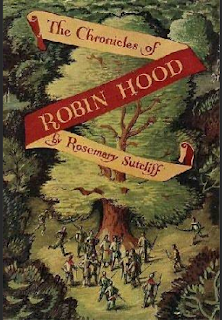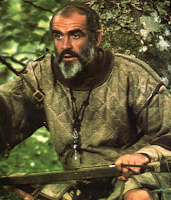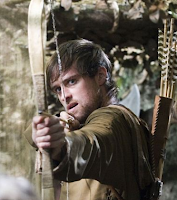This is Paul Magrs. Paul wrote the first book I read this year which was; Doctor Who - The Return of Robin Hood (2022). Unusually for me, this is a newly published book by an actual living author and there are certain possibilities inherent in that fact.
So, because I can be a cheeky wee chap at times, and because Paul was very lovely about it and said yes, what we have here is a rather brilliant interview about his book and the process of its creation.
Now go, read on, but tread with caution if you haven't already read The Return of Robin Hood yet because from here on...There be Spoilers!
Your book is one in a series where the Doctor and other characters from
the show crossover into other well-known fictional worlds. Were you
involved with the planning of the overall concept?
I first became aware of this series when Jac Rayner’s books appeared for
pre-order: Oz and Camelot. I loved the idea straight away. As a Puffin reader
and a Dr Who reader all my life – the idea of these worlds colliding was
irresistible to me. As I’ve said many times, in different ways – to me, Dr Who
was always a very bookish series. From the WH Allen hardbacks in our tiny town
library, to the perplexing Annuals on Boxing Day… to the Virgin books in the
heady days of the 1990s… Dr Who was most often about the books for me… and I
loved it when you could see the readerly roots of these stories. Maybe it was
because I grew up with 70s Who and the way those stories took their leads from
Gothic and Sci-fi classics? To me the best Dr Who was always a mash-up and the
TARDIS was always a kind of travelling library.
In projects like this,
do the authors have to share their general story ideas with each other to
ensure no two accidentally repeat a similar plot line or denouement?
I had space to develop
my own story… though once I chose Robin Hood there had to be all kinds of
complications… in that it had to be both a sequel and a prequel to ‘Robot of
Sherwood’… and then I wanted to bring in Richard the Lionheart, so it was also
a sequel to ‘The Crusaders’ novel, too… And of course I’d read Jac’s two books, so I
knew I wasn’t going to tread on any of her storylines.
Were you specifically
offered the Robin Hood commission or was that the one you were drawn to?
I gave a list of
Puffin Classics that I would love to write, and Robin Hood was at the top. I
love the mid twentieth century versions written by Roger Lancelyn Green and
Rosemary Sutcliff, and various others. I love the fact that the legend is never
static, from one iteration to the next. There are repeated motifs and plot
beats and characters… but there is no exact canon, when it comes to Robin Hood.


Also, there is so much
of the cycle of legends that doesn’t get told. The later bits, when Robin and
the Merry Men are middle aged and a bit jaded and cheesed off. You never hear
about that so much. Then there was the figure of Mother Maudlin, who is to be
found in the Lancelyn Green retelling… and who simply cried out to become a Dr
Who villain.
Did you have the
choice of which Doctor and companion(s) crossed into the world of Robin Hood?
I think my lovely
editor Tom suggested that the Fourth Doctor would be a good fit and – what with
the Nest Cottage Chronicles and all – he feels like my favourite Doctor to
write. As for Sarah and Harry… I always thought that they should have been
together as a family for a little longer. They were a brilliant team and I
loved writing both a possessed Sarah and an overly-enthusiastic Harry. One of
my favourite things in this whole novel is the Doctor and Sarah’s dismay when
they find that Harry has taught the Merry Men to sing the theme tune from the
Richard Greene Robin Hood TV show. It’s so exactly what Harry would do and it
still makes me laugh.
Its interesting to
imagine, not so much how other Doctors, but how other sets of companions would
have behaved differently than Sarah Jane and Harry do. For me that’s
what makes it such a perfect and lovely story. Had you considered
the 4th Doctor but with other companions or did it always have
to be this team to make it work properly?
My only other thought
would have been Romana and K9, perhaps. But perhaps they’re best saving up for
the story set at the end of the legend, when Robin becomes a pirate and is
finally defeated by evil nuns in Scarborough. That tale is yet to be told!
What is your writing
process for a book like this, distinct from your own original novels and other
commissions?
It’s more or less the
same! A long synopsis, outlining nearly everything that will happen, getting
that through a number of drafts and then getting it okayed by everyone. A
writing of a first draft that takes about three months with me writing a very
precise number of words every day… and then loads and loads of edit notes from
both the publisher and the BBC. There are more editorial eyes on these things
than most others, perhaps – because you’re writing for someone else’s universe.
(During the writing itself, it never feels like someone else’s universe. It
feels like it’s wholly mine, when I’m writing it. It has to feel like this
story will never get told in just this way, unless I do it my way.)
Do you plot out full
scene breakdowns in advance or just aim confidently towards a series of key
scenes.
As I go on (and it’s
almost thirty years doing this stuff now) I outline in more and more detail. It
just takes the sting out of things. Having said that, there were wild,
improvised flights of fancy involved in Robin Hood. The scene in which Mother
Maudlin flies all around the world, dragging the Doctor with her by his scarf…
and the Doctor unveiling his music room… these were all moments that came to
spontaneous life in the writing itself. You have to leave yourself leeway to
create new moments, even when sticking to the strictest of outlines.
Was there anything you
wanted to include but the word count forbade it; Anything on the
cutting room floor?
Not this time! Often
there are scenes lopped out or chapters pruned… but here I was quite economical
and everything is in there! I do think these 50k books are the right length for
Dr Who stories. The old 80k word novels always seemed slightly too long.
When did the
Carrionite enter into the planning? Was it an active idea from the
start to have additional elements of modern Who in the book or was it just too
perfect a fit to pass on?
From my editor, in the
first round of edits, if I remember. It was another nice little tie-in to
another old story.
I was more than happy
with their one tv appearance but now I want to imagine them lurking in the
background of other stories like The Robot of Sherwood, The Kings Demon, The
Visitation or The Awakening. Any desire to champion the species to even greater
notoriety?
What I like about them
is that they belong to this idea of the Dark Times… a kind of pre-Time Lord
universe in Dr Who, which is all monsters, creepy and grim. We’ve had mention
of vampires, giant spiders and these witchy beings. I love that there is a
Gothic universe that the Time Lords try to tidy up. To me, that’s a whole
ragbag of lore and potential story telling. If I were to start up spin-off or
tie-in line I would set it right there… ‘The Dark Times.’ It’s Patrick
Troughton’s voice going all spooky in ‘The Five Doctors’, explaining to the
Brigadier what Rassillon’s time must have been like. Yes, I’d make it all about
witches, the Sisterhood of Karn and the vampire lords.
Has writing this story
given you a taste to revisit this particular Tardis team again in the future
and do you have any clear idea of other stories you might like to tell?
I’m not sure! I love
them and would love to see more of them. But I’m thinking that it’s probably
time that I gave up on writing this Who stuff. I’ve got plenty of my own things
to write.
What is your favourite
other version of Robin Hood and why?
I love ‘Robin of
Sherwood’ because it was when I was a kid and it’s as full of nostalgia for me
as Dr Who is. There was magic in that show. And I love Richard Greene, and Sean
Connery in ‘The Lion in Winter’, and the episode in ‘Time Bandits’, of course.
In terms of books, it’s Lancelyn Greene and Rosemary Sutcliff. Here’s the thing
– I’d consider it a triumph if my book made readers want to go and read those
books by those two wonderful writers, and read their other books, too – which
are all warriors and knights, myths and monsters.
I'm guessing the
choices of which other fictional characters the Doctor could meet in this
series were based around what is in the public domain. If that
wasn’t a factor, which other fictional world do you think would make a fun
crossover?
I have many, many
ideas about this. Endless ones. But I probably ought to stop.
For my money I think
you have written Harry Sullivan’s finest hour. He’s not the least
bit bumbling or foolish. He’s brave, courageous and he could have
even got the girl at the end if he wasn’t so much of a
gentleman. Was this just the way the plotting lead him or something
you deliberately aimed to achieve?
I needed to write him
exactly as I saw him. He was an absolute legend – and Doctor Who knew it, even
when he called him an imbecile.
What is the most
enjoyable part for you; The planning, the writing, or having the positive
feedback from the readers once it’s out there?
The having
finished. The moment when everything is absolutely finished.
What are you working
on now that we should look out for in the future?
I have a new book of
drawings out this year – my third from Harper Collins – it’s called ‘Puss in
Books’, and it’s a celebration of cats. In August Puffin will be publishing
another literary mash-up by me, ‘Josephine and the Argonauts’… in which the
Third Doctor and Jo Grant are dragged away from UNIT HQ, falling into the
amazing MythoScope, where all the Greek legends are being endlessly played out.
They gather together the crew of the Argo and go in search of the Golden
Fleece, in an adventure that features as many gods, goddesses and monsters as I
could fit into it.
And finally; What
question should I have asked you or what do you never get asked that you would
like to say now?
Why
do I have the Doctor referred to in this book – two or three times – as ‘Doctor
Who’? A few people have remarked on it. I love it and, to me, that’s his name.
It’s his name especially in the cultural products and tie-in merchandise of the
mid-70s. He was ‘Doctor Who’ in the Annuals of the time, and in the Target
books of the time and the Weetabix collectible cards of the time… and that’s
why he’s still ‘Doctor Who’ to me.

Gathering a little woodland muse the day before the writing started
Well that was enormousness fun and absolutely above and beyond what I had hoped for. I obviously want to extend a massive thank you to Paul for sharing his time, his thoughts and the personal photos. There are a lot of books and audios out there with his name on the front so if you never have had the pleasure before, then its certainly way past time that you did.
Steve

































.jpg)
.jpg)
.jpg)










